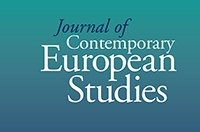(Journal of Contemporary European Studies) (Co-authored with Sandra Fernandes) Abstract: Estonia and Portugal are small states located at opposite geographical fringes of the European Union (EU) and the North Atlantic Treaty Organization (NATO). This article analyses how their NATO and EU memberships matter in escaping the anathema of periphery. We argue that the two countries can be comparable with each other because they share an experience of post-authoritarian democratization, a liminal geographic location with the ensuing geopolitical and security challenges. Our analysis is premised upon two correlative concepts of small states and marginality, whose meanings vary from geopolitical reasoning to constructivist accounts that put the emphasis on the relative notion of size as a product of self-perception. However, both approaches share at least one common point: ‘by joining international organizations, small states increase their capacity to be influential’, which is a central point in Noel Parker’s conceptualization of the phenomenon of marginality. Arguably, small states can positively use their non-central location by aspiring to belong to political and security core(s) through policies of institutional inclusion, and by influencing and reshaping the core(s). Building on these arguments, we look at peripheral positions as negative and marginality as positive for dynamics/strategies of belonging.
Read More © Journal of Contemporary European Studies










